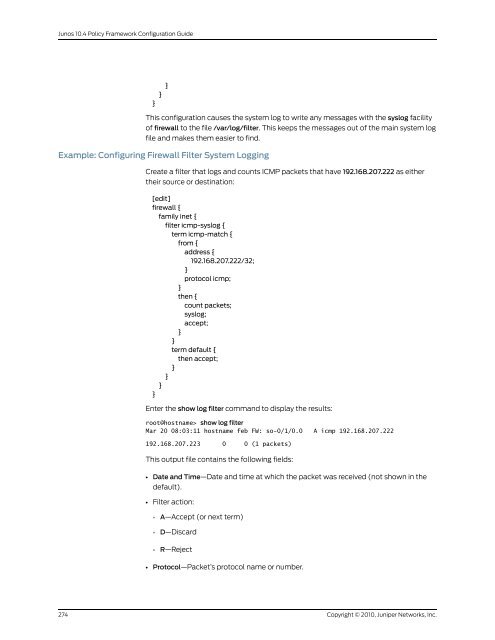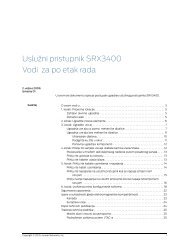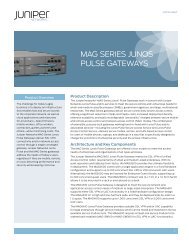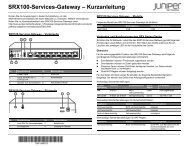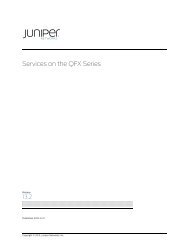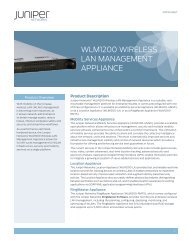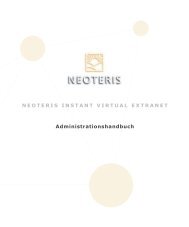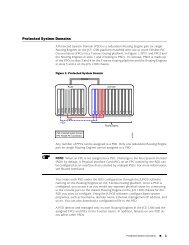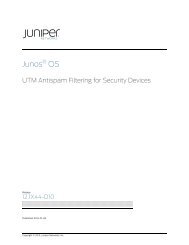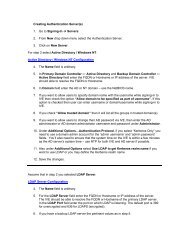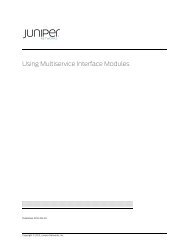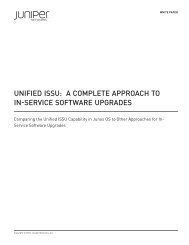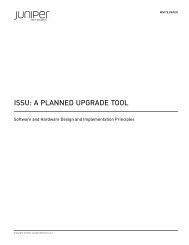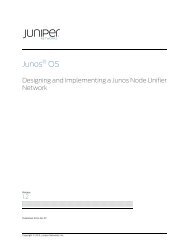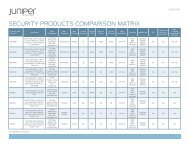- Page 1 and 2:
Junos ® OS Policy Framework Config
- Page 3 and 4:
END USER LICENSE AGREEMENT READ THI
- Page 5 and 6:
12. Commercial Computer Software. T
- Page 7 and 8:
Abbreviated Table of Contents Part
- Page 9 and 10:
Table of Contents About This Guide
- Page 11 and 12:
Table of Contents Testing Routing P
- Page 13 and 14:
Table of Contents Using Routing Pol
- Page 15 and 16:
Table of Contents Configuring Forwa
- Page 17 and 18:
Table of Contents Configuring Flow
- Page 19 and 20:
Table of Contents interface (Next-H
- Page 21 and 22:
List of Figures Part 1 Policy Frame
- Page 23 and 24:
List of Tables About This Guide . .
- Page 25 and 26:
About This Guide This preface provi
- Page 27 and 28:
About This Guide • MX Series •
- Page 29 and 30:
About This Guide Table 1: Notice Ic
- Page 31 and 32:
About This Guide or are covered und
- Page 33 and 34:
PART 1 Policy Framework • Introdu
- Page 35 and 36:
CHAPTER 1 Introduction to Policy Fr
- Page 37 and 38:
Chapter 1: Introduction to Policy F
- Page 39 and 40:
Chapter 1: Introduction to Policy F
- Page 41 and 42:
Chapter 1: Introduction to Policy F
- Page 43 and 44:
Chapter 1: Introduction to Policy F
- Page 45 and 46:
PART 2 Routing Policies • Introdu
- Page 47 and 48:
CHAPTER 2 Introduction to Routing P
- Page 49 and 50:
Chapter 2: Introduction to Routing
- Page 51 and 52:
Chapter 2: Introduction to Routing
- Page 53 and 54:
Chapter 2: Introduction to Routing
- Page 55 and 56:
Chapter 2: Introduction to Routing
- Page 57 and 58:
Chapter 2: Introduction to Routing
- Page 59 and 60:
Chapter 2: Introduction to Routing
- Page 61 and 62:
Chapter 2: Introduction to Routing
- Page 63 and 64:
Chapter 2: Introduction to Routing
- Page 65 and 66:
Chapter 2: Introduction to Routing
- Page 67 and 68:
CHAPTER 3 Routing Policy Configurat
- Page 69 and 70:
Chapter 3: Routing Policy Configura
- Page 71 and 72:
CHAPTER 4 Routing Policy Configurat
- Page 73 and 74:
Chapter 4: Routing Policy Configura
- Page 75 and 76:
Chapter 4: Routing Policy Configura
- Page 77 and 78:
Chapter 4: Routing Policy Configura
- Page 79 and 80:
Chapter 4: Routing Policy Configura
- Page 81 and 82:
Chapter 4: Routing Policy Configura
- Page 83 and 84:
Chapter 4: Routing Policy Configura
- Page 85 and 86:
Chapter 4: Routing Policy Configura
- Page 87 and 88:
Chapter 4: Routing Policy Configura
- Page 89 and 90:
Chapter 4: Routing Policy Configura
- Page 91 and 92:
Chapter 4: Routing Policy Configura
- Page 93 and 94:
Chapter 4: Routing Policy Configura
- Page 95 and 96:
Chapter 4: Routing Policy Configura
- Page 97 and 98:
Chapter 4: Routing Policy Configura
- Page 99 and 100:
Chapter 4: Routing Policy Configura
- Page 101 and 102:
Chapter 4: Routing Policy Configura
- Page 103 and 104:
Chapter 4: Routing Policy Configura
- Page 105 and 106:
Chapter 4: Routing Policy Configura
- Page 107 and 108:
Chapter 4: Routing Policy Configura
- Page 109 and 110:
Chapter 4: Routing Policy Configura
- Page 111 and 112:
Chapter 4: Routing Policy Configura
- Page 113 and 114:
Chapter 4: Routing Policy Configura
- Page 115 and 116:
Chapter 4: Routing Policy Configura
- Page 117 and 118:
Chapter 4: Routing Policy Configura
- Page 119 and 120:
Chapter 4: Routing Policy Configura
- Page 121 and 122:
Chapter 4: Routing Policy Configura
- Page 123 and 124:
Chapter 4: Routing Policy Configura
- Page 125 and 126:
Chapter 4: Routing Policy Configura
- Page 127 and 128:
CHAPTER 5 Extended Match Conditions
- Page 129 and 130:
Chapter 5: Extended Match Condition
- Page 131 and 132:
Chapter 5: Extended Match Condition
- Page 133 and 134:
Chapter 5: Extended Match Condition
- Page 135 and 136:
Chapter 5: Extended Match Condition
- Page 137 and 138:
Chapter 5: Extended Match Condition
- Page 139 and 140:
Chapter 5: Extended Match Condition
- Page 141 and 142:
Chapter 5: Extended Match Condition
- Page 143 and 144:
Chapter 5: Extended Match Condition
- Page 145 and 146:
Chapter 5: Extended Match Condition
- Page 147 and 148:
Chapter 5: Extended Match Condition
- Page 149 and 150:
Chapter 5: Extended Match Condition
- Page 151 and 152:
Chapter 5: Extended Match Condition
- Page 153 and 154:
Chapter 5: Extended Match Condition
- Page 155 and 156:
Chapter 5: Extended Match Condition
- Page 157 and 158:
Chapter 5: Extended Match Condition
- Page 159 and 160:
Chapter 5: Extended Match Condition
- Page 161 and 162:
Chapter 5: Extended Match Condition
- Page 163 and 164:
Chapter 5: Extended Match Condition
- Page 165 and 166:
Chapter 5: Extended Match Condition
- Page 167 and 168:
CHAPTER 6 Extended Actions Configur
- Page 169 and 170:
Chapter 6: Extended Actions Configu
- Page 171 and 172:
Chapter 6: Extended Actions Configu
- Page 173 and 174:
Chapter 6: Extended Actions Configu
- Page 175 and 176:
Chapter 6: Extended Actions Configu
- Page 177 and 178:
Chapter 6: Extended Actions Configu
- Page 179 and 180:
Chapter 6: Extended Actions Configu
- Page 181 and 182:
Chapter 6: Extended Actions Configu
- Page 183 and 184:
Chapter 6: Extended Actions Configu
- Page 185 and 186:
Chapter 6: Extended Actions Configu
- Page 187 and 188:
Chapter 6: Extended Actions Configu
- Page 189 and 190:
Chapter 6: Extended Actions Configu
- Page 191 and 192:
Chapter 6: Extended Actions Configu
- Page 193 and 194:
Chapter 6: Extended Actions Configu
- Page 195 and 196:
Chapter 6: Extended Actions Configu
- Page 197 and 198:
CHAPTER 7 Summary of Routing Policy
- Page 199 and 200:
Chapter 7: Summary of Routing Polic
- Page 201 and 202:
Chapter 7: Summary of Routing Polic
- Page 203 and 204:
Chapter 7: Summary of Routing Polic
- Page 205 and 206:
Chapter 7: Summary of Routing Polic
- Page 207 and 208:
Chapter 7: Summary of Routing Polic
- Page 209 and 210:
Chapter 7: Summary of Routing Polic
- Page 211 and 212:
Chapter 7: Summary of Routing Polic
- Page 213 and 214:
PART 3 Firewall Filters • Introdu
- Page 215 and 216:
CHAPTER 8 Introduction to Firewall
- Page 217 and 218:
Chapter 8: Introduction to Firewall
- Page 219 and 220:
Chapter 8: Introduction to Firewall
- Page 221 and 222:
Chapter 8: Introduction to Firewall
- Page 223 and 224:
CHAPTER 9 Firewall Filter Configura
- Page 225 and 226:
Chapter 9: Firewall Filter Configur
- Page 227 and 228:
Chapter 9: Firewall Filter Configur
- Page 229 and 230:
Chapter 9: Firewall Filter Configur
- Page 231 and 232:
Chapter 9: Firewall Filter Configur
- Page 233 and 234:
Chapter 9: Firewall Filter Configur
- Page 235 and 236:
Chapter 9: Firewall Filter Configur
- Page 237 and 238:
Chapter 9: Firewall Filter Configur
- Page 239 and 240:
Chapter 9: Firewall Filter Configur
- Page 241 and 242:
Chapter 9: Firewall Filter Configur
- Page 243 and 244:
Chapter 9: Firewall Filter Configur
- Page 245 and 246:
Chapter 9: Firewall Filter Configur
- Page 247 and 248:
Chapter 9: Firewall Filter Configur
- Page 249 and 250:
Chapter 9: Firewall Filter Configur
- Page 251 and 252:
Chapter 9: Firewall Filter Configur
- Page 253 and 254:
Chapter 9: Firewall Filter Configur
- Page 255 and 256: Chapter 9: Firewall Filter Configur
- Page 257 and 258: Chapter 9: Firewall Filter Configur
- Page 259 and 260: Chapter 9: Firewall Filter Configur
- Page 261 and 262: Chapter 9: Firewall Filter Configur
- Page 263 and 264: Chapter 9: Firewall Filter Configur
- Page 265 and 266: Chapter 9: Firewall Filter Configur
- Page 267 and 268: Chapter 9: Firewall Filter Configur
- Page 269 and 270: Chapter 9: Firewall Filter Configur
- Page 271 and 272: Chapter 9: Firewall Filter Configur
- Page 273 and 274: Chapter 9: Firewall Filter Configur
- Page 275 and 276: Chapter 9: Firewall Filter Configur
- Page 277 and 278: Chapter 9: Firewall Filter Configur
- Page 279 and 280: Chapter 9: Firewall Filter Configur
- Page 281 and 282: Chapter 9: Firewall Filter Configur
- Page 283 and 284: Chapter 9: Firewall Filter Configur
- Page 285 and 286: Chapter 9: Firewall Filter Configur
- Page 287 and 288: Chapter 9: Firewall Filter Configur
- Page 289 and 290: Chapter 9: Firewall Filter Configur
- Page 291 and 292: Chapter 9: Firewall Filter Configur
- Page 293 and 294: Chapter 9: Firewall Filter Configur
- Page 295 and 296: Chapter 9: Firewall Filter Configur
- Page 297 and 298: Chapter 9: Firewall Filter Configur
- Page 299 and 300: Chapter 9: Firewall Filter Configur
- Page 301 and 302: Chapter 9: Firewall Filter Configur
- Page 303 and 304: Chapter 9: Firewall Filter Configur
- Page 305: Chapter 9: Firewall Filter Configur
- Page 309 and 310: CHAPTER 10 Introduction to Traffic
- Page 311 and 312: Chapter 10: Introduction to Traffic
- Page 313 and 314: Chapter 10: Introduction to Traffic
- Page 315 and 316: CHAPTER 11 Policer Configuration Si
- Page 317 and 318: Chapter 11: Policer Configuration [
- Page 319 and 320: Chapter 11: Policer Configuration I
- Page 321 and 322: Chapter 11: Policer Configuration C
- Page 323 and 324: Chapter 11: Policer Configuration u
- Page 325 and 326: Chapter 11: Policer Configuration T
- Page 327 and 328: Chapter 11: Policer Configuration
- Page 329 and 330: Chapter 11: Policer Configuration }
- Page 331 and 332: Chapter 11: Policer Configuration N
- Page 333 and 334: Chapter 11: Policer Configuration }
- Page 335 and 336: Chapter 11: Policer Configuration C
- Page 337 and 338: Chapter 11: Policer Configuration A
- Page 339 and 340: Chapter 11: Policer Configuration p
- Page 341 and 342: Chapter 11: Policer Configuration C
- Page 343 and 344: Chapter 11: Policer Configuration p
- Page 345 and 346: Chapter 11: Policer Configuration c
- Page 347 and 348: CHAPTER 12 Summary of Firewall Filt
- Page 349 and 350: Chapter 12: Summary of Firewall Fil
- Page 351 and 352: Chapter 12: Summary of Firewall Fil
- Page 353 and 354: Chapter 12: Summary of Firewall Fil
- Page 355 and 356: Chapter 12: Summary of Firewall Fil
- Page 357 and 358:
Chapter 12: Summary of Firewall Fil
- Page 359 and 360:
Chapter 12: Summary of Firewall Fil
- Page 361 and 362:
Chapter 12: Summary of Firewall Fil
- Page 363 and 364:
Chapter 12: Summary of Firewall Fil
- Page 365 and 366:
Chapter 12: Summary of Firewall Fil
- Page 367 and 368:
Chapter 12: Summary of Firewall Fil
- Page 369 and 370:
Chapter 12: Summary of Firewall Fil
- Page 371 and 372:
Chapter 12: Summary of Firewall Fil
- Page 373 and 374:
PART 4 Traffic Sampling, Forwarding
- Page 375 and 376:
CHAPTER 13 Introduction to Traffic
- Page 377 and 378:
CHAPTER 14 Introduction to Traffic
- Page 379 and 380:
Chapter 14: Introduction to Traffic
- Page 381 and 382:
Chapter 14: Introduction to Traffic
- Page 383 and 384:
Chapter 14: Introduction to Traffic
- Page 385 and 386:
Chapter 14: Introduction to Traffic
- Page 387 and 388:
Chapter 14: Introduction to Traffic
- Page 389 and 390:
Chapter 14: Introduction to Traffic
- Page 391 and 392:
CHAPTER 15 Traffic Forwarding and M
- Page 393 and 394:
Chapter 15: Traffic Forwarding and
- Page 395 and 396:
Chapter 15: Traffic Forwarding and
- Page 397 and 398:
Chapter 15: Traffic Forwarding and
- Page 399 and 400:
Chapter 15: Traffic Forwarding and
- Page 401 and 402:
Chapter 15: Traffic Forwarding and
- Page 403 and 404:
Chapter 15: Traffic Forwarding and
- Page 405 and 406:
Chapter 15: Traffic Forwarding and
- Page 407 and 408:
Chapter 15: Traffic Forwarding and
- Page 409 and 410:
Chapter 15: Traffic Forwarding and
- Page 411 and 412:
Chapter 15: Traffic Forwarding and
- Page 413 and 414:
Chapter 15: Traffic Forwarding and
- Page 415 and 416:
CHAPTER 16 Summary of Traffic Sampl
- Page 417 and 418:
Chapter 16: Summary of Traffic Samp
- Page 419 and 420:
Chapter 16: Summary of Traffic Samp
- Page 421 and 422:
Chapter 16: Summary of Traffic Samp
- Page 423 and 424:
Chapter 16: Summary of Traffic Samp
- Page 425 and 426:
Chapter 16: Summary of Traffic Samp
- Page 427 and 428:
Chapter 16: Summary of Traffic Samp
- Page 429 and 430:
Chapter 16: Summary of Traffic Samp
- Page 431 and 432:
Chapter 16: Summary of Traffic Samp
- Page 433 and 434:
Chapter 16: Summary of Traffic Samp
- Page 435 and 436:
Chapter 16: Summary of Traffic Samp
- Page 437 and 438:
Chapter 16: Summary of Traffic Samp
- Page 439 and 440:
Chapter 16: Summary of Traffic Samp
- Page 441 and 442:
Chapter 16: Summary of Traffic Samp
- Page 443 and 444:
Chapter 16: Summary of Traffic Samp
- Page 445 and 446:
Chapter 16: Summary of Traffic Samp
- Page 447 and 448:
Chapter 16: Summary of Traffic Samp
- Page 449 and 450:
Chapter 16: Summary of Traffic Samp
- Page 451 and 452:
Chapter 16: Summary of Traffic Samp
- Page 453 and 454:
Chapter 16: Summary of Traffic Samp
- Page 455 and 456:
Chapter 16: Summary of Traffic Samp
- Page 457 and 458:
Chapter 16: Summary of Traffic Samp
- Page 459 and 460:
Chapter 16: Summary of Traffic Samp
- Page 461 and 462:
Chapter 16: Summary of Traffic Samp
- Page 463 and 464:
Chapter 16: Summary of Traffic Samp
- Page 465 and 466:
Chapter 16: Summary of Traffic Samp
- Page 467 and 468:
Chapter 16: Summary of Traffic Samp
- Page 469 and 470:
Chapter 16: Summary of Traffic Samp
- Page 471 and 472:
Chapter 16: Summary of Traffic Samp
- Page 473 and 474:
Chapter 16: Summary of Traffic Samp
- Page 475 and 476:
Chapter 16: Summary of Traffic Samp
- Page 477 and 478:
Chapter 16: Summary of Traffic Samp
- Page 479 and 480:
Chapter 16: Summary of Traffic Samp
- Page 481 and 482:
Chapter 16: Summary of Traffic Samp
- Page 483 and 484:
Chapter 16: Summary of Traffic Samp
- Page 485 and 486:
Chapter 16: Summary of Traffic Samp
- Page 487 and 488:
Chapter 16: Summary of Traffic Samp
- Page 489 and 490:
Chapter 16: Summary of Traffic Samp
- Page 491 and 492:
PART 5 Indexes • Index on page 46
- Page 493 and 494:
Index Symbols ! in policy expressio
- Page 495 and 496:
Index Layer 2 bridging traffic (MX
- Page 497 and 498:
Index input statement..............
- Page 499 and 500:
Index P P2MP.......................
- Page 501 and 502:
Index show policy damping command..
- Page 503 and 504:
Index of Statements and Commands A
- Page 505 and 506:
Index of Statements and Commands si


